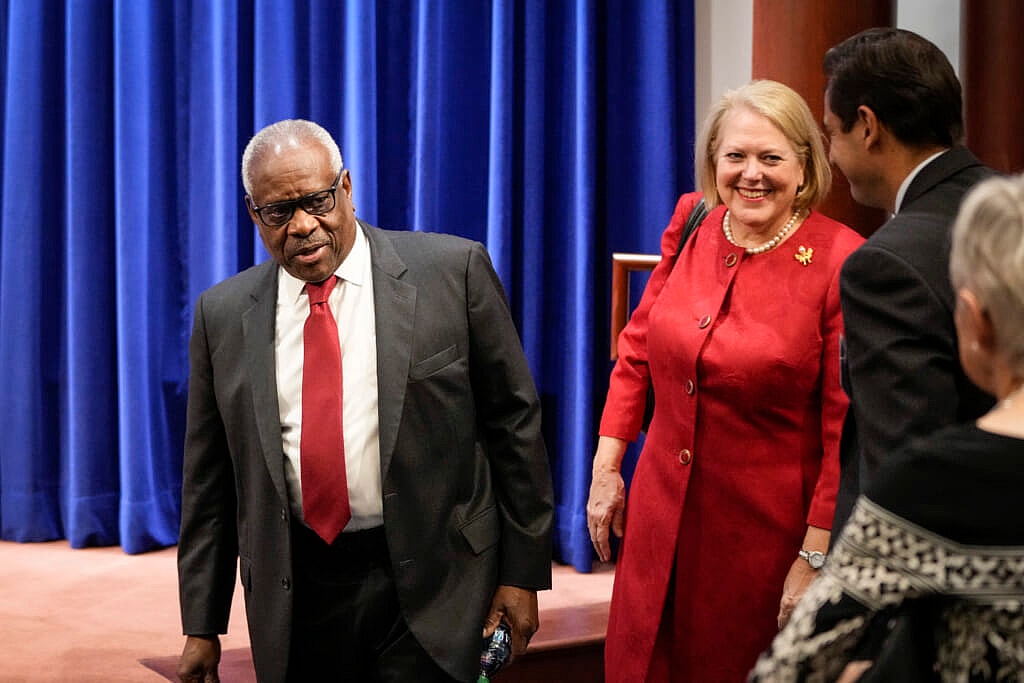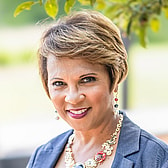Editor’s note: The following article is an op-ed, and the views expressed are the author’s own. Read more opinions on theGrio.
It looks like Justice Clarence Thomas is in trouble again—this time with law students at George Washington University in Washington, D.C. We all know that Justice Thomas has been a problem for the Black community since the day that President George H.W. Bush nominated him in 1991 for the Supreme Court to replace civil rights icon Justice Thurgood Marshall. Since then, he has also become a problem for other marginalized groups.
Many in the Black community took great offense that then-President Bush nominated Thomas to replace someone like Marshall, who was instrumental in advancing the rights of Black people, particularly in education. The very laws that Marshall pioneered and advanced in the 1950s, namely Brown v. Board of Education benefitted a new generation of Black citizens like Justice Thomas, who was himself a beneficiary of affirmative action programs when he attend the College of the Holy Cross and Yale University Law School.
In their book, Supreme Discomfort, former Washington Post reporters Michael Fletcher and Kevin Merida wrote of Thomas and how the Black community viewed him: “There is no more powerful, detested, misunderstood African American in our public life than Clarence Thomas.”

The truth is, Thomas has always been controversial. In his eight-year tenure as chairman of the Equal Employment Opportunity Commission, an analysis showed that Thomas actively engaged in shifting policy in which class-action suits became a lower priority than individual remedies, meaning that a group of victims claiming discrimination at a company were less likely to get redress than an individual who claimed unequal treatment at that company. Civil rights groups felt that this weakened racial discrimination laws.
Bill Taylor, a veteran civil rights attorney who was interviewed for an Associated Press story on Thomas, titled “Thomas Presided Over a Shift in Policy at EEOC” back in 1991 said, ″While he was in federal government he took a view of civil rights laws that were so narrow as to be ineffective. He refused to recognize the affirmative role of the government in protecting against discrimination.″
Couple that history with his most recent concurring opinion in the Dobbs case, in which Thomas wrote in part, “In future cases, we should reconsider all of this Court’s substantive due process precedents, including Griswold, Lawrence, and Obergefell.” The rulings he referred to guarantee the right to contraception and same-sex marriage. His concurrence sent shockwaves throughout the nation as he signaled that the court would not stop at dismantling Roe v. Wade and that other constitutional rights could also be at risk. This is Thomas being Thomas. He started his career limiting the civil rights of Black people and has expounded his perceived assaults on the rights of women and the LGBTQ+ community.
Since his long tenure on the court, Thomas has been a caricature of so-called radical Black conservatism. He is viewed as anti-affirmative action, anti-woman and anti-progressive ideology. Instead, he embraces the controversial originalist judicial philosophy, held by mostly white male conservative justices—as well as Justice Amy Coney Barrett—over the last 200 years. Last week, this all seemed to catch up with Justice Thomas as he was to teach a class at George Washington University Law School but decided to withdraw amid protests by students and faculty. I must admit, I was shocked that such a stalwart for free speech and free thought backed down so readily to the “cancel culture” mob that was assembled against him. I found Justice Thomas’ decision troubling because he has taught at GW law school since 2011 with little fanfare. It was only recently that his adjunct faculty position there drew protests and disruption after the court’s conservative majority overturned Roe v. Wade.
My issue with Thomas is that he seems to be engaging in double-speak when it comes to walking the talk of his conservative beliefs. He was wrong to step down from his teaching position at GW law in the face of controversy. As a fellow Black conservative (well, I am a far bit more moderate than Thomas), I have known Justice Thomas since I was a young committee counsel working for the House Republican majority in 1997. I have a cordial relationship with the justice and find him to be a likable person one on one. Yet, my duty as a journalist and columnist is to engage in well-thought-out analyses and vetting of our American ideals, our leaders and our processes of equality and freedom of thought.
Justice Thomas missed a golden opportunity to teach his students and engage in up-close and personal viewpoint diversity. He had an opportunity to speak with his students about the true meaning of free speech and how we talk it out as Americans even when we disagree. The problem we have right now is that we run from controversy and courageous conversations. I know what I speak firsthand as a university scholar and adjunct professor who lost my position over a free speech controversy on my Virginia campus last fall. I had no power in my situation. Justice Thomas is arguably the most powerful Black man in America. His concurring opinion in Dobbs made clear just how powerful he is.
At the end of the day, Black conservatives like Thomas need to walk the talk they preach. If Thomas believes that individual liberty and free speech are indeed at stake, then he has to stand up for that not just by the power of his pen from the bench but by the power of his example in what he does as an adjunct professor faculty member committed to academic freedom and the free exchange of ideas and academic excellence.

Sophia A. Nelson is a contributing editor for theGrio. Nelson is a TV commentator and is the author of “The Woman Code: Powerful Keys to Unlock,” “Black Women Redefined.”
TheGrio is FREE on your TV via Apple TV, Amazon Fire, Roku, and Android TV. Please download theGrio mobile apps today!


